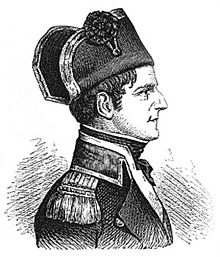Olfert Fischer
| Olfert Fischer | |
|---|---|

Portrait of Olfert Fischer
|
|
| Born |
4 August 1747 Copenhagen, Denmark |
| Died | 18 February 1829 (aged 81) Copenhagen, Denmark |
| Buried at | Reformed Church, Copenhagen |
| Allegiance |
|
| Service/branch | Royal Dano-Norwegian Navy |
| Rank | Vice Admiral |
| Battles/wars | |
Johan Olfert Fischer (4 August 1747 – 18 February 1829) was a Danish officer in the Royal Dano-Norwegian Navy. He commanded the Dano-Norwegian fleet against British forces under Lord Nelson during the Battle of Copenhagen on 2 April 1801.
Johan Olfert Fischer was born in Copenhagen in 1747, the son of the Danish Vice Admiral Olfert Fasvier Fischer whom he followed to a naval career. While still a young man, his rise through the military ranks was set back and almost destroyed in an incident with a prostitute while he was on guard duty on the island of Holmen off Copenhagen. The prostitute compounded Fischer's disgrace by accusing him of violent assault and her charges were believed by a military court: Fischer, then a lieutenant, was punished and demoted back to common seaman for a period of one year.
By 1784, however, Fischer had rebuilt his reputation enough to be promoted to captain, and he was dispatched to the West Indies as commander of the warship Bornholme. It was during this three-year mission that he first met — on friendly terms — his future foe Nelson, then a captain aboard HMS Boreas.
By 1801, Fischer had risen to the rank of commodore and was appointed to lead the critical naval defense of Copenhagen during the French Revolutionary Wars. Aboard his flagship Dannebrog, he attempted to organize a comprehensive defense with which to face Nelson's invading British armada. The Dannebrog, however, caught fire early in the battle and Fischer was forced to transfer his command, first to a different ship and then, when that ship was crippled also, to a shore-based battery. Under these circumstances, Fischer had little control over the situation and Nelson himself was inclined to believe he had surrendered. Though the Danish fleet fought a spirited battle, the much larger British force eventually compelled a ceasefire through one of Fischer's subordinate commanders. Recent histories have posited the difficulty of battle communications and a cumbersome Danish chain of command as reasons for the end of hostilities. Fischer, however, believed otherwise: he swiftly published an official account of the action in which he asserted that the Dano-Norwegian fleet had not in fact been bested, and that the British arrangement of a truce had been a ruse de guerre to mask their retreat. Nelson dismissed these claims vehemently, yet privately admitted that the victory "had not been as complete as he had hoped."
...
Wikipedia
